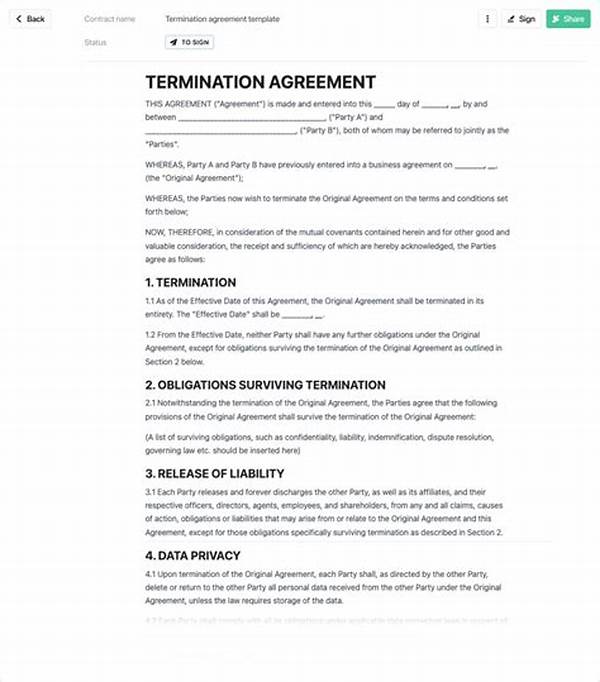Consignment contracts, a vital component in various business agreements, are designed to facilitate the sale of goods where the consignor keeps ownership until the consignee sells the goods. In these contracts, termination clauses play a pivotal role, as they outline the conditions and grounds upon which the contract can be dissolved. Having a clear understanding of termination clauses in consignment contracts ensures that both parties are aware of their rights and obligations, reducing potential disputes and misunderstandings. Such clauses address a multitude of scenarios, from breach of contract to simple voluntary termination. Let us delve into the intricacies and implications of these clauses.
Read Now : Engaging Viewers With Artistic Captions
Understanding Termination Clauses
Termination clauses in consignment contracts serve as a safeguard to ensure that both parties have clear guidelines on exiting the agreement. These clauses may include conditions for voluntary or involuntary termination, procedures to follow upon termination, and any potential liabilities or penalties involved. Understanding these provisions is crucial; they provide clarity and protection for both consignor and consignee. For instance, a termination clause might specify that either party can end the contract given a 30-day notice, offering a balanced approach to severing ties. By clearly defining the parameters for termination, these clauses help prevent unnecessary legal entanglements and ensure a smoother transition should either party decide to terminate the agreement.
Key Elements in Termination Clauses
1. Notice Period: It’s common for termination clauses in consignment contracts to stipulate a notice period, allowing parties time to prepare for the contract’s conclusion.
2. Conditions for Termination: These clauses typically outline specific conditions under which termination is permitted, safeguarding the interests of both parties.
3. Rights and Obligations: Termination clauses in consignment contracts often clarify the rights and responsibilities of each party upon termination, outlining clear expectations.
4. Financial Settlements: Provisions for financial reconciliation post-termination are usually included, ensuring any outstanding debts or payments are addressed.
5. Dispute Resolution: Many agreements incorporate a method for resolving disputes arising from the termination, aiming to handle disagreements amicably and efficiently.
Detailed Examination of Termination Clauses
In the realm of consignment, termination clauses are not only about ending an agreement but also about managing the consequences and obligations resulting from that decision. Termination clauses in consignment contracts often specify various reasons for concluding a partnership. For example, the inability to sell a minimum amount of goods, breach of contractual terms, or mutual agreement can be valid grounds for termination. Having such multifaceted clauses ensures that parties engage in consignment with clear expectations and exit strategies, fostering an environment of trust and predictability.
Moreover, the repercussions of terminating a consignment contract are detailed within these clauses. They may include protocols for handling remaining unsold goods, addressing outstanding payments, and resolving any disputes or claims. This detailed post-termination process ensures that the end of the business relationship does not result in chaos or financial loss. By providing a structured outline of the termination process, the clauses protect the interests of both consignor and consignee, enabling them to conclude their business relationship with professionalism and minimal disruption.
Common Features of Termination Clauses
1. Flexibility: Termination clauses in consignment contracts are often designed to offer flexibility, providing options for both parties to end the contract under mutually agreeable terms.
2. Protection Against Breach: They protect against breaches by stipulating consequences for failing to deliver on contractual obligations.
3. Preventative Measures: By setting clear standards, termination clauses can prevent disputes by pre-emptively addressing potential issues.
4. Time Frames: Specific time frames for notice and execution of termination are outlined, ensuring timely actions.
5. Role Clarity: Clear distribution of roles post-termination leads to lesser ambiguities regarding responsibilities or actions.
Read Now : Adaptive Reuse Of Existing Structures
6. Financial Clarity: Terms regarding settlement of accounts help prevent financial disputes.
7. Asset Management: Guidelines for handling unsold goods or assets post-termination ensure orderly management.
8. Continuity of Obligations: Certain obligations may continue post-termination to ensure an orderly wind-up of the partnership.
9. Legal Framework: Offers a legal framework for addressing grievances arising from termination decisions.
10. Consensual Ground: Some clauses allow for termination based on mutual agreement, demonstrating an understanding of dynamic business needs.
Implementing Effective Termination Clauses
Implementing effective termination clauses in consignment contracts is a strategic move to protect and enhance business relations. Such clauses are not merely legal formalities but integral parts of contract negotiation and execution. They contribute to a clearer understanding between the consignor and consignee, reducing the risk of disputes. The primary goal is to draft clauses that are fair to both parties, maintaining the balance of power and ensuring that neither is unfairly disadvantaged during contract termination.
Additionally, these clauses often act as a deterrent against potential breaches or unwarranted terminations. By clearly outlining the grounds for contract dissolution and the consequences of failing to adhere to the agreement, termination clauses promote responsible and ethical business conduct. They also create a framework through which disputes can be handled efficiently, minimizing the need for litigation. Ensuring that these clauses are comprehensive and well-drafted requires careful consideration of each party’s unique needs and circumstances, sustaining orderly and professional business partnerships.
Drafting Considerations for Termination Clauses
When drafting termination clauses in consignment contracts, it’s imperative to ensure that they are tailored to the specific requirements of the involved parties. This includes considering the nature of the consigned goods, the duration of the contract, and the business objectives of both parties. By taking these factors into account, termination clauses become more than mere terms and conditions—they evolve into essential tools that facilitate a smooth and amicable end to the contractual relationship.
Furthermore, these clauses need to be clear and unambiguous, avoiding any potential loopholes or grey areas that might lead to disputes. It’s advisable for parties to engage legal expertise during the drafting process to ensure the clauses are legally sound and enforceable. Through thoughtful and precise drafting, termination clauses serve to protect the interests of both the consignor and consignee while ensuring the consignment relationship remains beneficial and sustainable throughout its duration.
Conclusion on Termination Clauses
In conclusion, termination clauses in consignment contracts are essential components that provide structure and clarity to business agreements. They serve as a safeguard against unforeseen disputes and allow for a structured approach to contract termination. Clear and well-drafted termination clauses help prevent potential business conflicts by outlining the procedures, rights, and responsibilities of each party. These clauses are not only about ending a consignment relationship but also ensuring that its conclusion is handled with professionalism and competence.
Termination clauses also emphasize the importance of clear communication and mutual understanding in any business agreement. By defining each party’s obligations, they foster cooperation and trust, which are vital for effective business operations. Companies engaging in consignment deals should prioritize the inclusion of comprehensive termination clauses to protect their interests and ensure that their business relationships can be concluded efficiently when necessary. The strategic implementation of these clauses enhances the overall integrity and functionality of consignment contracts, ultimately contributing to successful and enduring business partnerships.



